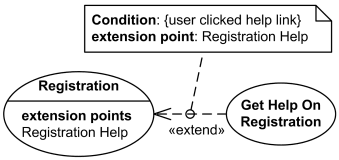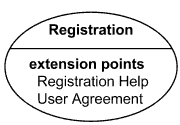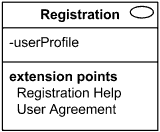UML Use Case Extend
Extend is a directed relationship that specifies how and when the behavior defined in usually supplementary (optional) extending use case can be inserted into the behavior defined in the extended use case.
Extended use case is meaningful on its own, it is independent of the extending use case. Extending use case typically defines optional behavior that is not necessarily meaningful by itself. The extend relationship is owned by the extending use case. The same extending use case can extend more than one use case, and extending use case may itself be extended.
The extension takes place at one or more extension points defined in the extended use case.
Extend relationship is shown as a dashed line with an open arrowhead directed from the extending use case to the extended (base) use case. The arrow is labeled with the keyword «extend».

Registration use case is complete and meaningful on its own.
It could be extended with optional Get Help On Registration use case.
The condition of the extend relationship as well as the references to the extension points are optionally shown in a comment note attached to the corresponding extend relationship.

Registration use case is conditionally extended by Get Help On Registration
use case in extension point Registration Help.
Extension Point
An extension point is a feature of a use case which identifies (references) a point in the behavior of the use case where that behavior can be extended by some other (extending) use case, as specified by extend relationship.
Extension points may be shown in a compartment of the use case oval symbol under the heading extension points. Each extension point must have a name, unique within a use case. Extension points are shown as a text string according to the syntax:
extension point ::= name [: explanation ]
The optional explanation is some description usually given as informal text. It could be in other forms, such as the name of a state in a state machine, an activity in an activity diagram, some precondition or postcondition.

Registration use case with extension points
Registration Help and User Agreement
Extension points may be shown in a compartment of the use case rectangle with ellipse icon under the heading extension points.

Extension points of the Registration use case,
shown using the rectangle notation